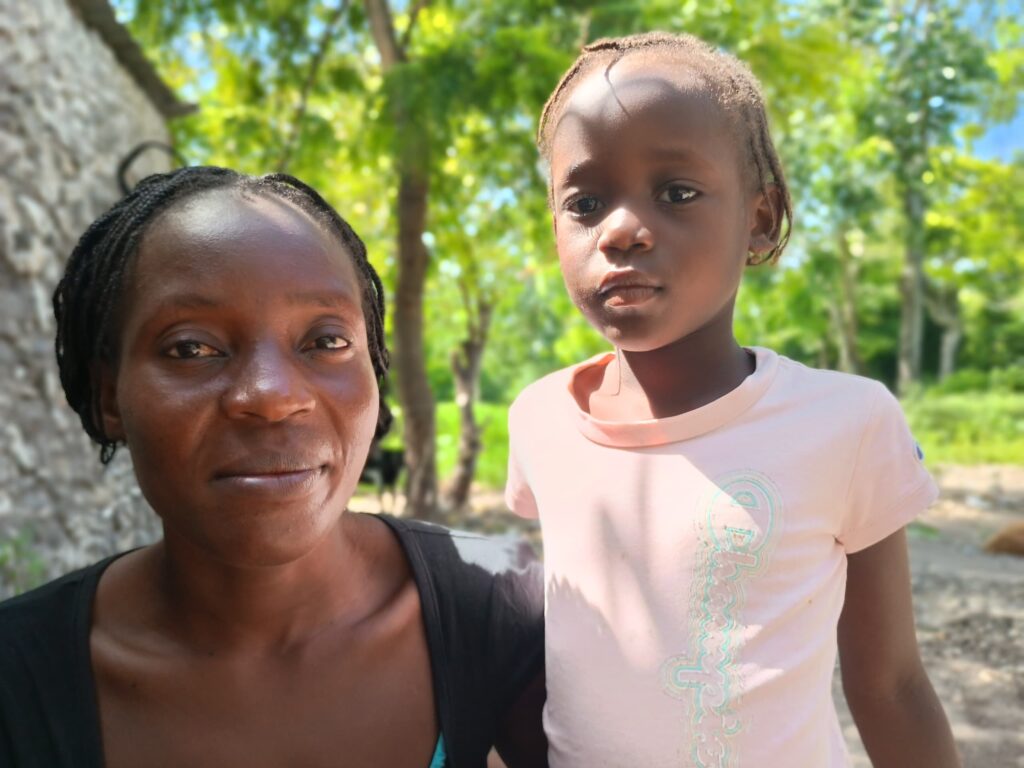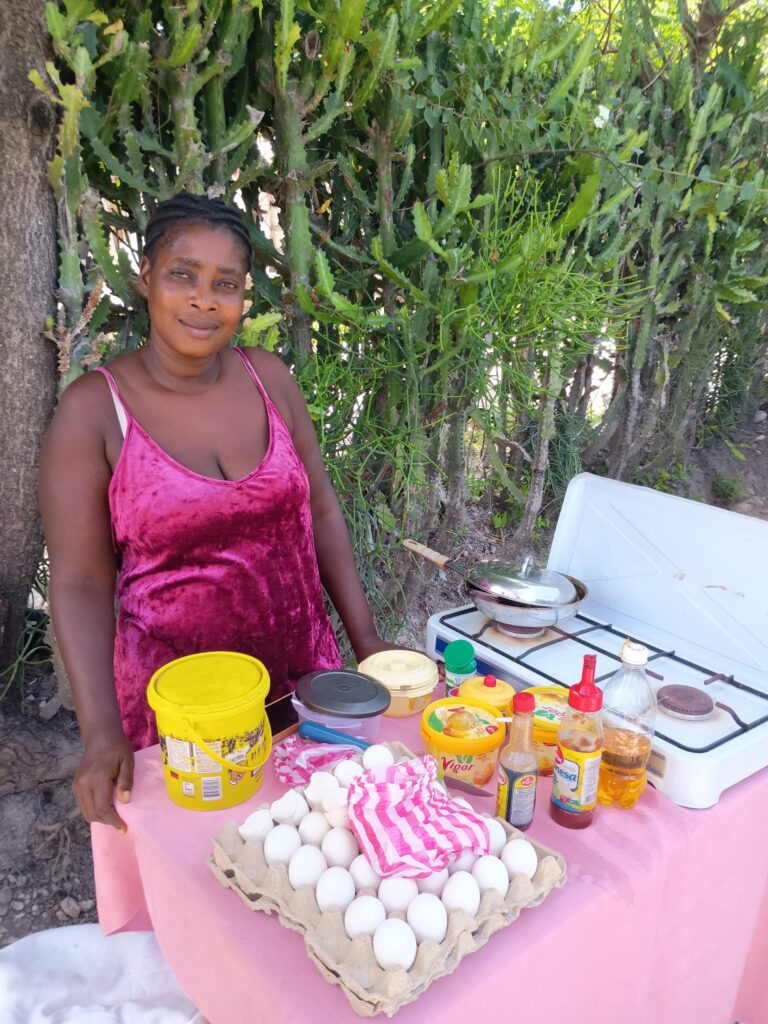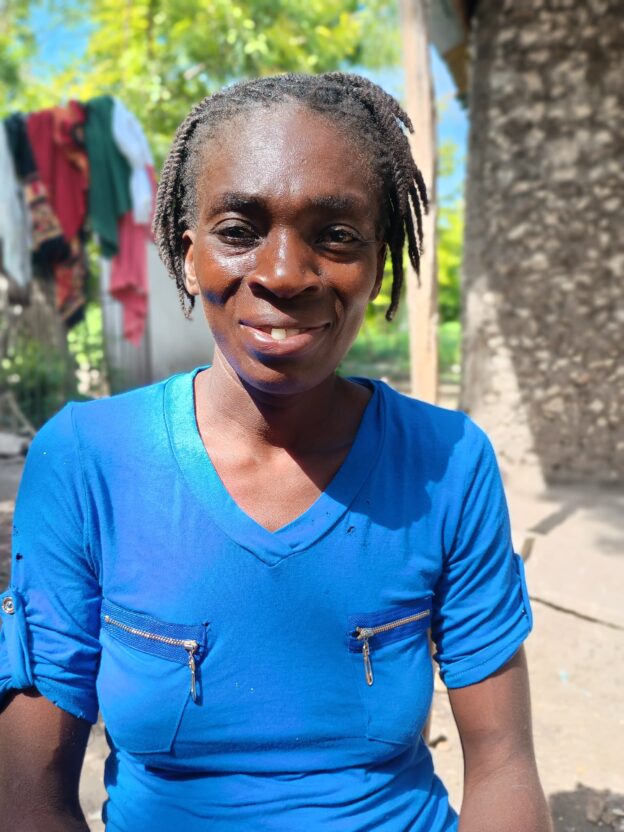Annia lives in Maren, an area of Verèt, a large commune that sits along the Artibonit River in Central Haiti. She shares a small house with her two daughters, ages eleven and four. The girls’ father does not help them. “I am their mother and their father now.”
Before Annia joined the CLM program, she struggled to support her girls. She would sometimes do laundry for a neighbor or various other chores she could find to do, like shucking peanuts or beating dried beans out of their pods. “I might not always get paid with money, but at least they would give me food I could bring home.”
She also managed a small commerce. A friend of hers taught her how, at least during the right times of the year, she could by millet or corn with credit from farmers, take it to be milled, and sell the milled product for a small profit. The rest of the year, she would buy small piles of used clothing on credit, and sell individual pieces, either sitting in a spot in the market or strolling around with them in her hands and on her head.
When she joined the program, she initially decided to invest in a pig and small commerce with the funds Fonkoze would make available. But she began to feel as though the opportunities to engage in trading were disappearing because of the way gang control of the communes just west of Verèt eliminated access to the larger markets there, and so she bought goats with the money she would have used for her commerce. She ended up buying three. The purchase left her enough to buy a chicken as well.
She soon added a fourth goat. She bought it herself when she it was her turn to receive the funds from a savings club she joined using the cash stipend she was receiving for the program’s first months. It was only a very small goat. It cost just 4,000 gourds. But she’s been taking good care of it, and it is growing. One of the other ones miscarried, but another one is in the last stages of pregnancy, so she should have an additional goat or two soon.
Her pig grew quickly, but it died before she could realize all the profit from it. She was able to sell the meat, however, and she bought two very small piglets with the money from the sale. Those two pigs are now doing well.
She participates actively in her savings and loan association. At the end of the first cycle, she had accumulated more than 20,000 gourds, and she really needed the money at the time. She used most of it to pay her children’s school fees and to eliminate some old debts. She did not hesitate to continue in the association for its second cycle. She buys shares every week. She does not know yet what she will do with her savings at the end of the next cycle, but she has time to plan.
She has no doubt about her longer-term plan. “I still live on family land. I want to use the animals I am raising to buy land of my own that I can leave to my girls”
When asked about what she’s accomplished in the program so far, she is just as clear. “I used to wake up some days without any hope. I had nothing to feed my girls and no idea where I might get something. The girls would tell me that they were hungry, and there’d be nothing I could say to them. I don’t have that problem any more.”

Annia’s next-door neighbor is her sister, Fabienne. She lives in a small house with her husband, Jean Wisly, and their two daughters. She is also a CLM member, but she joined as part of a newer program, one for families not quite as poor. Rather than the whole package of accompaniments that Annia is receiving, Fabienne received only funds to invest in earning income, the chance to participate in a savings and loan association, and monthly visits from a member of the CLM staff.
It would be easy to imagine that the difference in the treatment the sisters have received could become a source of jealousy, but Fabienne says she hasn’t felt that at all. “I don’t need to feel jealous. Not everyone is at the same level.”
And her situation was different from the one her sister was facing. Her husband is a devoted father. Sometimes he goes to work in the Dominican Republic, but at home he farms as a sharecropper. “He’s not afraid to do what he has too. He’ll even sell a day of labor when that’s all he can find.” She would bring in money as well, trading in the nearby markets in Dezam and central Verèt. She had no steady commerce, but would go to the market with whatever money she had, look for something she could buy, and try to set it at a profit.
When Fonkoze offered her funds to invest to make her business grow, she chose to go in a different direction. It might have seemed natural for Fabienne just to invest in the kind of trading she was already doing, but larger trading activities in her region used to start with merchants who would buy at the important regional market in Ponsonde or even in nearby cities like Senmak or Gonayiv. But passage to all those areas has become dangerous because of a gang which has occupied Ponsonde. Commerce is difficult, so Fabienne decided to invest in livestock instead. She bought three goats with funds from Fonkoze, and used the change to purchase poultry. She eventually bought an additional goat with money that she and Jean Wisly were able to save out of what they brought in.Two of the four goats are now pregnant, so she may have more goats soon.
Like Annia, she likes saving money in her savings and loan association, and she is happy to say why. “When I save in my VSLA, the box isn’t in my hands and neither is the key. I can’t get my hands on the money, and so I can save.” She used the money she received at the end of the first cycle to do several things, including buying a pig, and she shares Annia vision for the future. “We’re living on our family’s land. My husband and I want to buy land of our own. I’ll sell all the animals I own if I have to.”

Fania is a single mother of three who lives just down a dirt path from Annia and Fabienne. Like Annia, she is a member of the program for families in the deepest poverty.
Just two of her three children live with her. Her middle child lives with the child’s grandmother. “He was the only child the man had, and when we broke up his family asked for him, so I let them take him.” She now lives alone with her two other children in a house that belonged to her late mother.
She used to support her kids with a business selling housewares. She would borrow money from her aunt, and buy her merchandise in Senmak or Ponsonde. But she gave that business up when the trip came to seem too dangerous. It got to the point that there were days when she could not feed her kids at all.
She asked the CLM team to help her buy some goats with the money it could make available to her. She bought two, and now she has six.
But she also has been able to start a new business. She lives right behind a school, and when it is in session, she sits out front making and selling fried snacks, “fritay.” Schoolchildren eat them before and after school and during recess. When the school is not in session — like now, when summer vacation has begun — she sells fried egg sandwiches. The sandwiches, called “pen a ze,” are a popular street food.
Much of the money to start the commerce came into her hands when she received pay-out at the end of her savings and loan association’s first cycle, even though much of that money went towards overdue school bills and food for the household as well. But she is excited about the second cycle. Her group is a couple of months into their one-year cycle. This time she wants to buy a cow.
